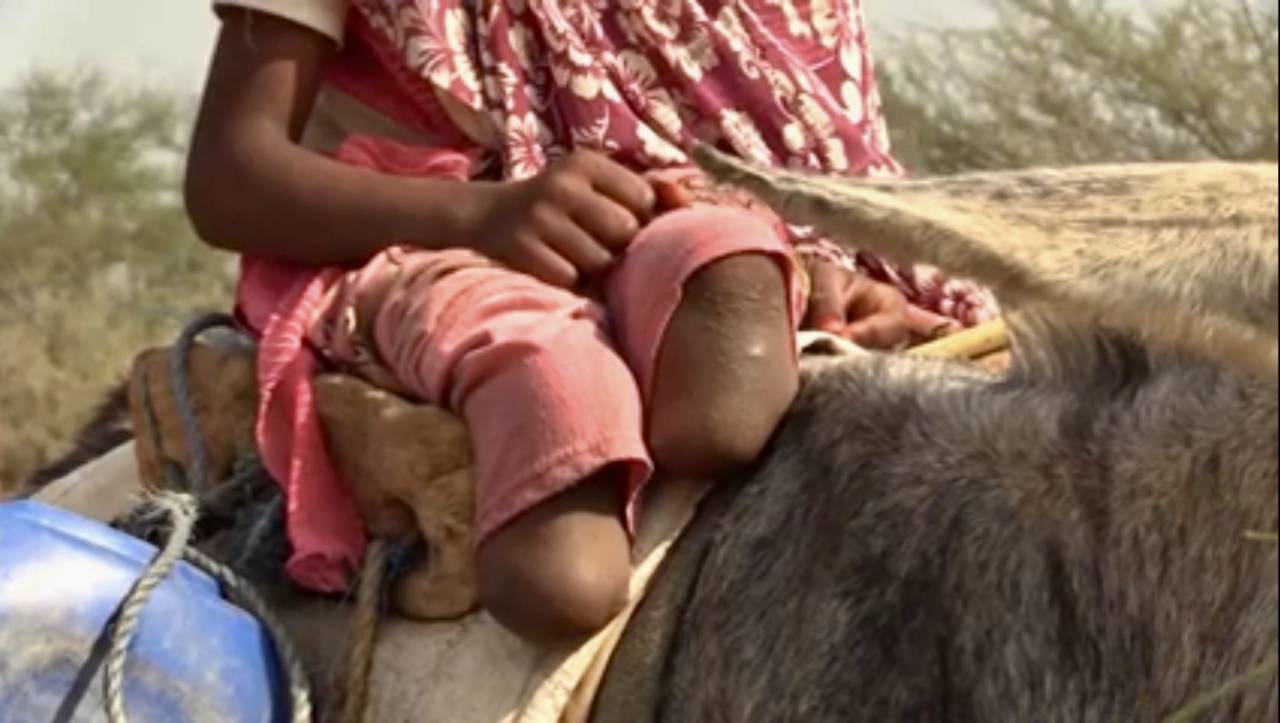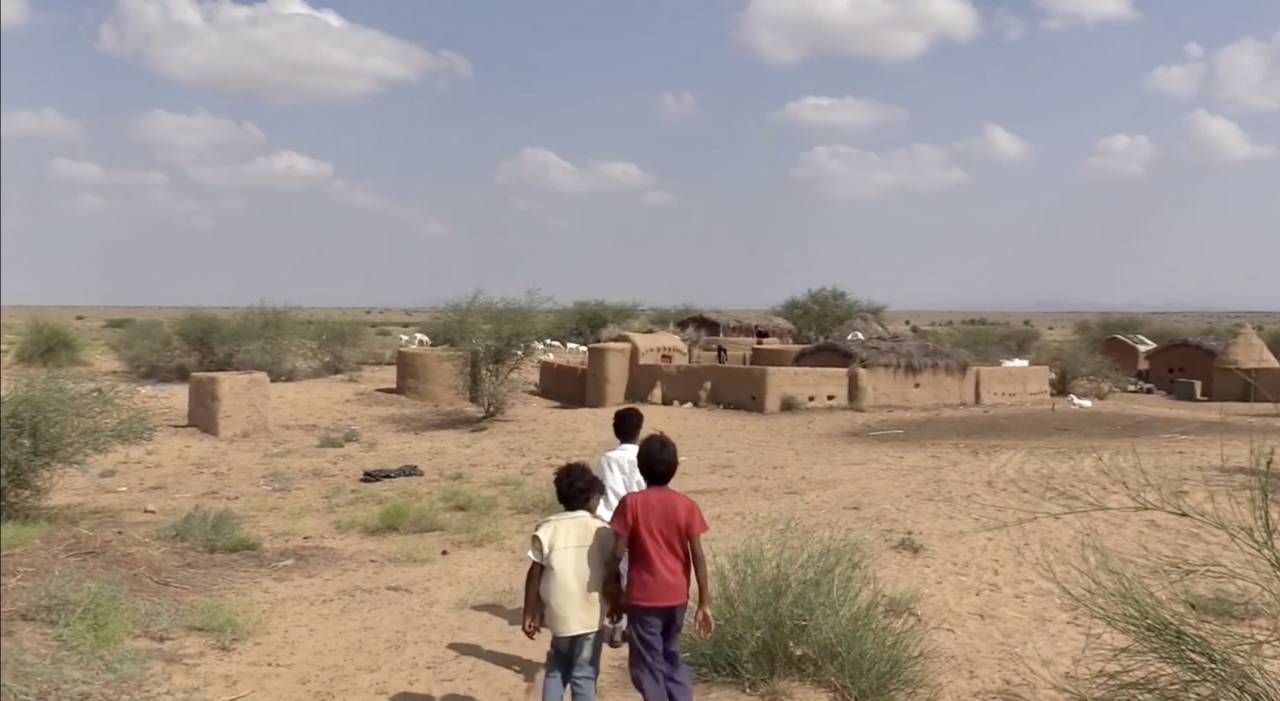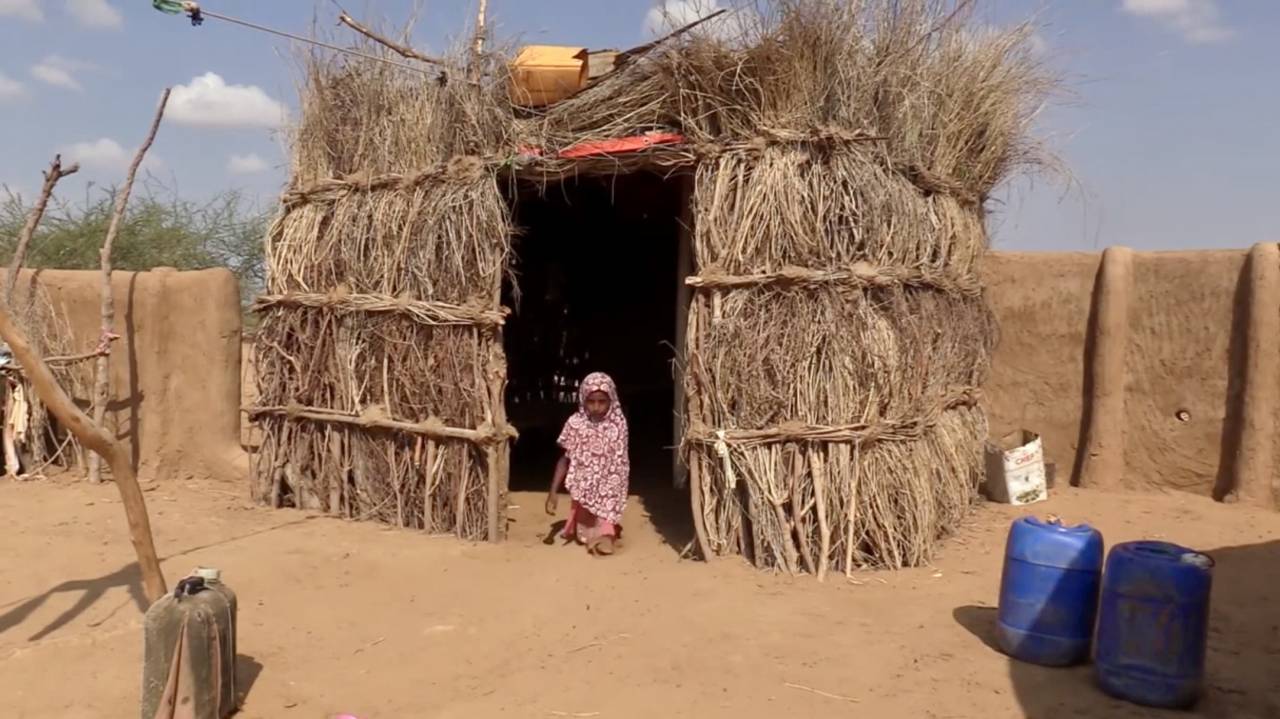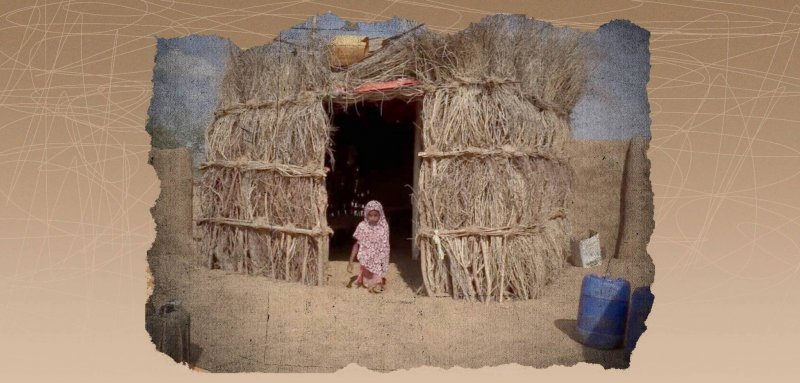Because of a landmine that took her legs two years ago, 7-year-old Elham Shaw'i has to ride a donkey to transport her between her grandfather's farm and cottage in the secluded Bani Hassan area of Abs District, in the Hajjah governorate in western Yemen. Because of the bitter reality she lives in, the child now must live through an incomplete childhood, losing dreams that the war has turned into nightmares.
Elham lives with her parents and brother Ahmed in her grandfather's "nest house", a hut built of straw, tree branches, and mud.
"I cannot walk. I now live as half a body," she says with tears in her eyes.

Her brother Ahmed, who is four years older than her, experienced the cruelness of war one year before she did. The war, which does not differentiate between the young and old, had left behind a landmine that exploded near him while he was grazing sheep, making him lose his left hand, and with it, his confidence to go outside their nest house, because of the fear that a mine would explode under him at any moment.
In a tone full of pain, Ahmad describes the fear he cannot get rid of and his life in the village, "Mines are everywhere, and I'm afraid to leave the house, I'm afraid that...", he trails off, stretching out his left arm and indicating the emptiness left behind by his amputated hand.
What exacerbated the isolation of Ahmed, his sister, and thousands of other Yemeni children, especially in remote areas and villages, was having to stop attending school due to being forced to constantly keep moving around over the past eight years during the Yemeni war, for fear of being caught under its fire.

Two million mines and 10,000 victims
According to international estimates, around two million anti-personnel and anti-vehicle mines have been planted during the Yemen war, in all the areas that witnessed direct confrontations between the Houthis and government forces.
These sources deny that the mines were planted indiscriminately. Rather they believe that they have been skillfully distributed along roads, agricultural lands, and areas covered with trees, with the aim of causing as many civilian and combatant casualties as possible.
The map of the confrontations that took place during the war indicates that they begin from the governorate of Aden and its surroundings in the south, to extend to the governorate of Saada and the rest of the border areas with Saudi Arabia in the far north, passing through the governorates of Lahij, Taiz, Hodaydah, Marib, Shabwah, al-Bayda, al-Dhalea, Abyan, Al Jawf, Hajjah, and other governorates that have been ravaged by the war.
The United Nations estimates the number of those dead and injured as a result of mines in Yemen at more than ten thousand, in addition to other direct effects it had like the destabilization of local communities and the displacement of populations, especially within Hajjah Governorate.
A landmine exploded near 11-year-old Ahmed while he was grazing sheep, making him lose his left hand, and with it, his confidence to go outside their hut, because of the fear that a mine would explode under him at any moment
In a statement on January 26th, 2022, UNICEF confirmed that landmines in Yemen have polluted agricultural lands and disrupted relief aid. The shape, form, method of operation, and destructive power of landmines and unexploded munitions remain largely unknown and thus pose a direct threat to civilians, especially children.
The landmines that overcrowd the farms and roads of the villages of Bani Hassan in Abs District have destroyed the two sources of livelihood that the citizens there depend on: farming and herding.
That's what Ahmed and Elham's grandfather, Mohamad Shaw'i says. The 48-year-old speaks with great sorrow about his journey of displacement with his family. They had left the village six years ago when the flames of war reached it, only to return two years later to find that it had turned into a minefield along with its surroundings.
He says, "There are so many mines here of different sizes and shapes. My grandson Ahmed was the first victim. He had thought that the round object he had found out in the open was a toy, and he was lucky that the resulting explosion from the landmine had only amputated his hand, while many others have lost their lives."
He paused for a moment as he thought back to those events before adding in a voice choked by regret, "A year later, his sister Elham followed. She was on her way to the field on the back of a donkey to bring us lunch. Along the way, the donkey stepped on a landmine, which immediately exploded, and so her legs were amputated and the donkey died."
Shaw'i lives with the members of his family, as do the families of the entire region, under constant anxiety, with everyone taking every step with extreme caution for fear of landmines. They often use donkeys to travel while moving between farms and other nearby areas.
Serious material losses
Livestock, too, have not been spared from landmines. Mohamad Shaw'i lists his losses which include two cars, 25 sheep, one camel, and a number of donkeys.
Ali Ibrahim, another farmer from the area, says that he knows the total number of material losses that the residents in the villages of Bani Hassan have suffered. He estimates it to be at 65 heads of cattle and eight cars, and believes that they are huge losses, since the population there as a whole is poor and mainly depends on what they've lost to live.
He goes on to add, "But in any case, it is in no way equivalent to the loss of lives and limbs to those damned mines."
"Little Elham was on her way to the field on the back of a donkey to bring us lunch. Along the way, the donkey stepped on a landmine, which immediately exploded, and so her legs were amputated and the donkey died"
Speaking on the indirect damages suffered by the villagers as a result of the mines, Ibrahim attests that they were no longer able to go to their fields, farmlands, and pastures. "We've become nearly completely trapped inside our villages and homes," he says.
According to the Yemeni Landmine Observatory, January 2022 was a tragic month for civilians and engineering teams, as 36 people were killed and 37 were wounded from mines and explosive devices.
The Observatory said in a statement that it had documented the killing of thirty civilians, including children, most of whom were in the governorates of Shabwah, Hodaydah, Marib, and Al Jawf. It also recorded the injury of around 35 civilians in the same or other governorates, along with the death of six demining (mine-clearing) workers and the injury of two others.
The Yemeni Landmine Observatory confirmed on February 9 that two experts from the 'MASAM' project, a Saudi demining project in Yemen, were killed while performing their mine-clearing duties in Hays District, south of Hodaydah Governorate.
Slow demining efforts
The United Nations Emergency Mine Action Project, based in the capital Sana'a, recently announced that it has completed the survey and clearance of more than 23 million square meters of land, clearing nearly 635,000 pieces of explosive munitions, confirming the presence of explosives in large areas of land across Yemen, including populated areas.
Yemen was supposed to be declared a mine-free zone in 2012, after removing those planted during the war between rebels and the Imamate regime in 1962, as well as the conflict between northern and southern Yemen between 1979 and 1982, when the border areas between them, which were the main scene of confrontations, were planted with a large number of mines.
Shaw'i Bilal, 55, a resident of Midi District in Hajjah Governorate, needed three continuous days to roam the desert in mid-2020 in search of his eldest son Ibrahim, who had gone out to herd camels, before he found his body parts after he was torn apart by a landmine that had exploded under him.
He burst into tears as he recalled what had happened to his son. He says, "What did he do wrong? Why was he killed? He did not take part in the war, and he never thought of anything other than herding camels. Who bears responsibility? Who will bring me back my son?"
In view of the slow pace of clearing the country's land of mines, retired military officer Sabri Assem believes that international and local bodies should intensify awareness campaigns about their dangers, through sessions held for parents and for children in schools.
"Many people don't know the shapes of explosives or the ways one can minimize damage from mines as much as possible, so they become casualties, especially children," he says.
Elham Shaw'i waves from atop her donkey at those she passes by on her way to transport food to her grandfather on the farm and on her way back, trying to adapt to the reality of her disability until she finds an opportunity to obtain prosthetic limbs.

She knows the way there and back like the back of her hand, and never deviates from the path. Deep down, she knows that deviating could lead to something even more serious than what had happened to her.
All the villagers in Yemen are doing what Elham does to avoid the fate that befell her, and the warring forces are well aware of this as well, so they strive to plant more mines in their paths, so that the number of deaths by mines will continue rising until one day Yemen finally says goodbye to war.
Raseef22 is a not for profit entity. Our focus is on quality journalism. Every contribution to the NasRaseef membership goes directly towards journalism production. We stand independent, not accepting corporate sponsorships, sponsored content or political funding.
Support our mission to keep Raseef22 available to all readers by clicking here!
Interested in writing with us? Check our pitch process here!



